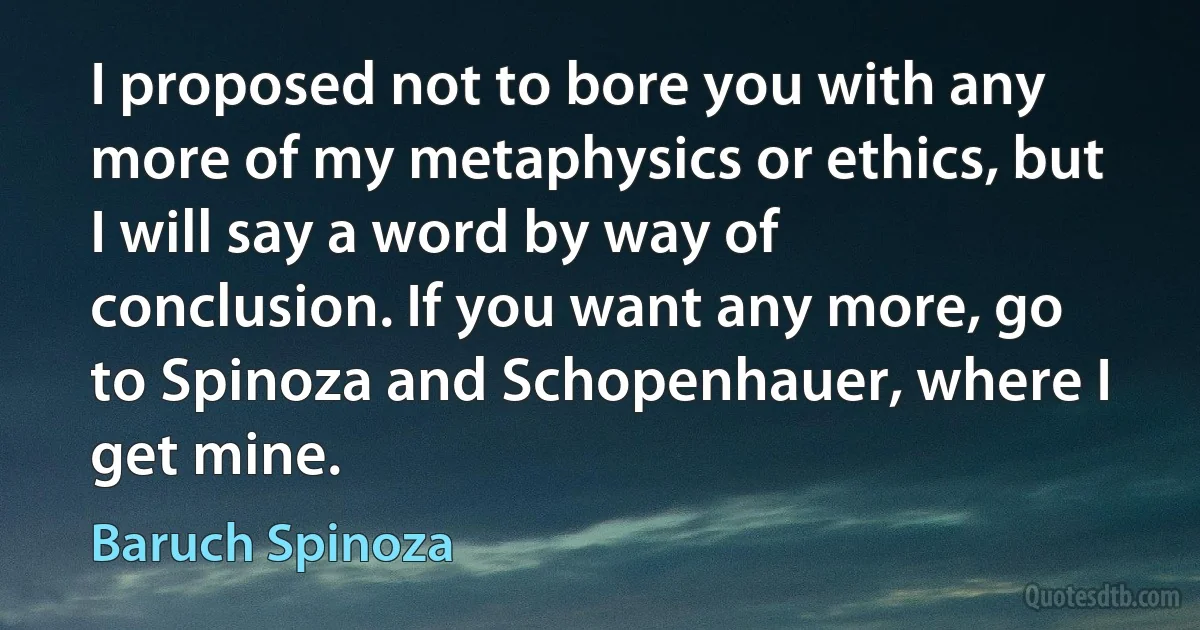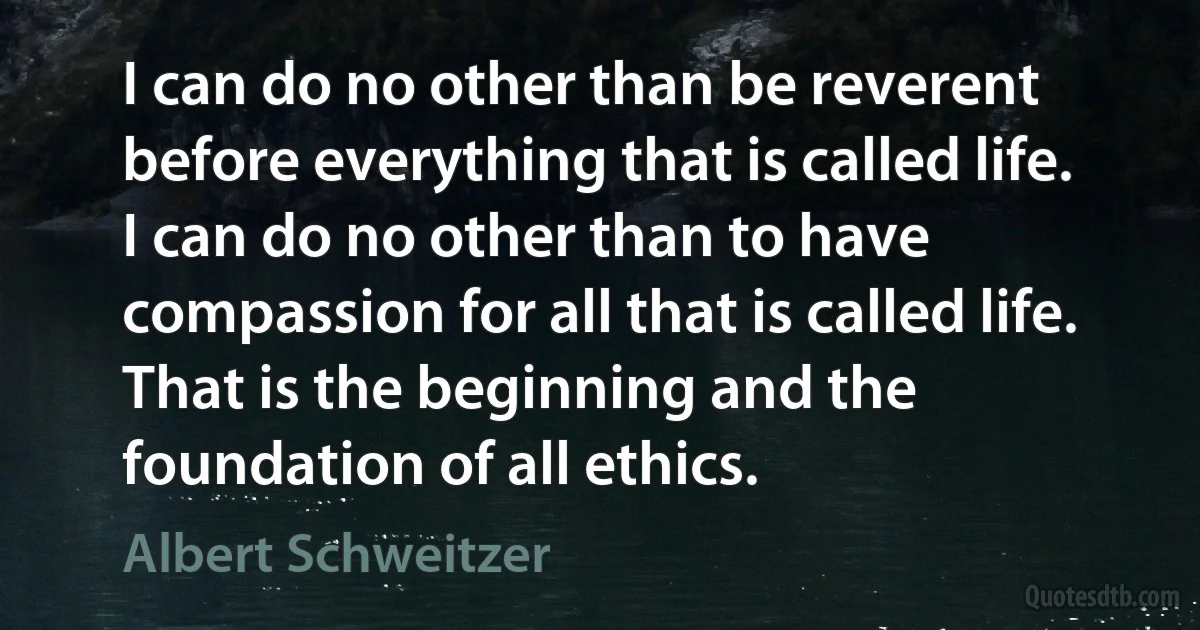Ethics Quotes - page 9
Spinoza is a highly systematic thinker, but still I do not think I can offer a single key for all things Spinozistic. Personally, one thing which got me excited about Spinoza is his philosophical boldness, i. e., his willingness to pursue philosophical exploration as far as he can, making very little concessions to commonly accepted beliefs and norms. In terms of content, I take his attempt to conceive of God, nature, and ethics in a manner that is free from anthropomorphism and anthropocentric illusions as one of the deepest elements of his philosophical thinking. A closely related issue is his advocacy of actual infinity (an issue that has been mostly neglected in recent literature). Finally, the very attempt to do philosophy systematically (rather than rely on fragmented and disassociated intuitions) and transparently (laying bare the logical structure of his arguments) commands my respect, indeed admiration.

Baruch Spinoza
Under Aristotle the "Reader," whose knowledge of Trojan aretê seems conspicuously absent, forms and substances dominate all. The Good is a relatively minor branch of knowledge called ethics; reason, logic, knowledge are his primary concerns. Aretê is dead and science, logic and the University as we know it today have been given their founding charter: to find and invent an endless proliferation of forms about the substantive elements of the world and call these forms knowledge, and transmit these forms to future generations. As "the system."

Robert M. Pirsig
When you'd lived long enough, she'd sometimes reflected, when certain habits had become ingrained no matter what refreshment of the neural pathways the immortality genes could bestow, ethics and etiquette became ever less distinct. Hitherto the involuntary equation had read one way, in disproportionate pangs of conscience over a small breach of manners. Now the terms had been inverted, and she felt over the Council majority's horrible, criminal, potentially murderous mistake the sort of acute embarrassment that might have been appropriate for some ghastly faux pas. Dreadfully sorry, I'm such a ditz about these nuclear attack protocols...

Ken MacLeod
In an age when immense technological advances have created lethal weapons which could be, and are, used by the powerful and the unprincipled to dominate the weak and the helpless, there is a compelling need for a closer relationship between politics and ethics at both the national and international levels. The Universal Declaration of Human Rights of the United Nations proclaims that 'every individual and every organ of society' should strive to promote the basic rights and freedoms to which all human beings regardless of race, nationality or religion are entitled. But as long as there are governments whose authority is founded on coercion rather than on the mandate of the people, and interest groups which place short-term profits above long-term peace and prosperity, concerted international action to protect and promote human rights will remain at best a partially realized struggle.

Aung San Suu Kyi
We sat on a crate of oranges and thought what good men most biologists are, the tenors of the scientific world - temperamental, moody, lecherous, loud-laughing, and healthy. [...] Your true biologist will sing you a song as loud and off-key as will a blacksmith, for he knows that morals are too often diagnostic of prostatitis and stomach ulcers. Sometimes he may proliferate a little too much in all directions, but he is as easy to kill as any other organism, and meanwhile he is very good company, and at least he does not confuse a low hormone productivity with moral ethics.

John Steinbeck
I'm not sure who's in charge of "The Stone,” the New York Times‘s philosophy column, but that person is not doing their job. Imagine if some of our greatest living philosophers would post there about matters diverse: ethics, animal rights, abortion, drone strikes, and so on. But all too often the column is about God; that is, we have Great Minds lucubrating about nonexistent beings. Among all species of philosophy, the philosophy of religion is the most intellectually depauperate. It's a waste of time.

Jerry Coyne
Of course, atheism, which is merely the lack of belief in gods, isn't responsible for explaining altruism and ethics, a task that properly belongs to philosophy, science, and psychology. And those areas have offered plenty of nonreligious explanations for the "Moral law” and altruism. The explanations involve evolution, reason, and education.

Jerry Coyne
I came to office promising major ethics reform to end the culture of self-dealing. And today, that ethics reform is a law. While I was at it, I got rid of a few things in the governor's office that I didn't believe our citizens should have to pay for. That luxury jet was over-the-top. I put it on eBay.

Sarah Palin
We are allowed to question people about their politics or ethics and expect them to defend their beliefs, or at least hold their own in any other important matter by recourse to evidence, yet somehow on the massive subject of God and how he might have us behave, all rational discussion must stop the moment we hear 'I believe.

Derren Brown
Though the theology of Christianity had thus sunk to the lowly estate of a mere delusion of the rabble, propagated on that level by the ancient caste of sacerdotal parasites, the ethics of Christianity continued to enjoy the utmost acceptance, and perhaps even more acceptance than ever before. It seemed to be generally felt, in fact, that they simply must be saved from the wreck-that the world would vanish into chaos if they went the way of the revelations supporting them. In this fear a great many judicious men joined, and so there arose what was, in essence, an absolutely new Christian cult-a cult, to wit, purged of all the supernaturalism superimposed upon the older cult by generations of theologians, and harking back to what was conceived to be the pure ethical doctrine of Jesus.

H. L. Mencken
Human labor, through all its forms, from the sharpening of a stake to the construction of a city or an epic, is one immense illustration of the perfect compensation of the universe. The absolute balance of Give and Take, the doctrine that every thing has its price, - and if that price is not paid, not that thing but something else is obtained, and that it is impossible to get any thing without its price, - is not less sublime in the columns of a leger than in the budgets of states, in the laws of light and darkness, in all the action and reaction of nature. I cannot doubt that the high laws which each man sees implicated in those processes with which he is conversant, the stern ethics which sparkle on his chisel-edge, which are measured out by his plumb and foot-rule, which stand as manifest in the footing of the shop-bill as in the history of a state, - do recommend to him his trade, and though seldom named, exalt his business to his imagination.

Ralph Waldo Emerson



